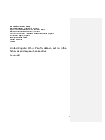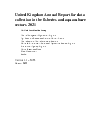Data Collection Framework
Information on the UK's implementation of Data Collection Framework legislation (as amended in retained EU law)
As an independent coastal State, the UK is responsible for meeting a wide range of international agreements and commitments which involve the collection of fisheries data. Section 1 of the Fisheries Act 2020 provides for a “scientific evidence objective” where:
- scientific data relevant to the management of fish and aquaculture activities is collected,
- where appropriate, the fisheries policy authorities work together on the collection of, and share, such scientific data, and
- the management of fish and aquaculture activities is based on the best available scientific advice.
Background
In order to meet the Fisheries Act 2020 “scientific evidence objective”, and to ensure the continuity and consistency of fisheries data collection in the short-term, the UK will follow the data collection requirements of:
- Regulation (EU) 2017/1004 of the European Parliament and of the Council of 17 May 2017 on the establishment of a Union framework for the collection, management and use of data in the fisheries sector and support for scientific advice regarding the common fisheries policy and repealing Council Regulation (EC) No 199/2008 (recast) ’ (as amended in retained EU law) Hereafter referred to as the Data Collection Framework.
Multiannual Programme
Under the Data Collection Framework, each Fisheries Administration may establish a multiannual programme for the collection and management of fisheries data. The UK’s current multiannual programme comprises of:
-
Commission Implementing Decision (EU) 2019/909 of 18 February 2019 establishing the list of mandatory research surveys and thresholds for the purposes of the multiannual Union programme for the collection and management of data in the fisheries and aquaculture sectors (as amended in retained EU law), and
-
Commission Delegated Decision (EU) 2019/910 of 13 March 2019 establishing the multiannual Union programme for the collection and management of biological, environmental, technical and socioeconomic data in the fisheries and aquaculture sectors (as amended in retained EU law).
UK Work Programme
The UK work programme sets out in detail the data collection activities to be carried out in line with the multiannual programme. The current UK work programme for the period 2024 is available below:
UK Annual Report 2023
This report sets out how the UK has implemented its multi-annual programme under the Data Collection Framework for 2023.
UK Annual Report 2022
This report sets out how the UK has implemented its multi-annual programme under the Data Collection Framework for 2022.
UK Annual Report 2021
This report sets out how the UK has implemented its multi-annual programme under the Data Collection Framework for 2021.
The work plan followed in 2021 is as was supplied to the European Commission in October 2019.
National Fisheries Laboratories
The national fisheries laboratories are responsible for delivery of UK fishery and survey data. All three laboratories, working together, carry out shore-based and sea-based sampling of UK fleets operating in waters off each country, as well as conducting internationally coordinated surveys:
- England and Wales: Centre for Environment, Fisheries and Aquaculture Science (Cefas)
- Scotland: Marine Scotland
- Northern Ireland: Agri-Food and Biosciences Institute (AFBI)
Additional to the three national fisheries laboratories:
- Seafish, a non-departmental public body, is currently commissioned on behalf of the UK to collect a range of socio-economic data for the fishing fleet, processing and aquaculture sectors.
- The Environment Agency (EA) and Natural Resources Wales (NRW) have a role in working with CEFAS in carrying out activities related to eels in river systems in England and Wales.
Updates to this page
-
Update 16/08/24
-
UK Work Programme - update
-
Update 12 January 2024
-
Updated UK Work programme and its attachments.
-
UK Annual Report 2021
-
page content updated for 2022
-
June 2019 update
-
Page updated
-
Text updated
-
Text amended
-
Changes to the text
-
First published.



